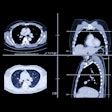Dear CT Insider,
CT exams are key to tracking disease severity and evaluating the efficacy of treatment in patients with various lung conditions. But agreement among readers can be low, due in part to variations in their experience.
In this edition's Insider Exclusive, we're highlighting a study that shows how an artificial intelligence (AI) algorithm boosted clinicians' accuracy in identifying pulmonary texture patterns -- to the point that the authors suggested it could serve as a "second-reader" tool for assessing these patterns.
When you've read this feature story, find out more about CT and AI through our coverage of research showing that using AI with whole-head CT scans in hemorrhagic stroke patients can quantify hematoma. However, despite its benefits, AI should be used carefully with CT, cautioned a team from Tongji Medical College's Union Hospital in Wuhan, China: One algorithm improved detection of cerebral aneurysms on CT angiography but also boosted the false-positive rate.
What's the latest for CT and lung cancer screening? A group from the American Cancer Society discovered that CT lung cancer screening rates are falling short, with as few as one in 20 eligible adults complying with guidelines -- at the same time that researchers from the University of Georgia confirmed that CT lung cancer screening is effective for reducing death from the disease. And in work published this month in the Journal of Bone and Mineral Research, a Chinese team found that CT lung cancer screens offer the additional benefit of providing data needed to perform bone density analysis.
Check out our coverage of a study that suggested the CT radiation dose for patients with COVID-19 varies widely, highlighting a need to standardize protocols. Finally, take a look at our story on how the modality helped diagnose and save the life of an 18-year-old man from Kansas who developed Lemierre syndrome, a rare condition that can occur after wisdom teeth extraction that manifests as thrombosis of the superficial internal jugular vein.
Although this eventful year is coming to a close, there will be more CT research to explore at the upcoming RSNA 2020 virtual meeting (watch for our Road to RSNA coverage, posting November 17). Check in regularly with AuntMinnie.com's CT Community for the modality's current news and research developments as we head into 2021.





















